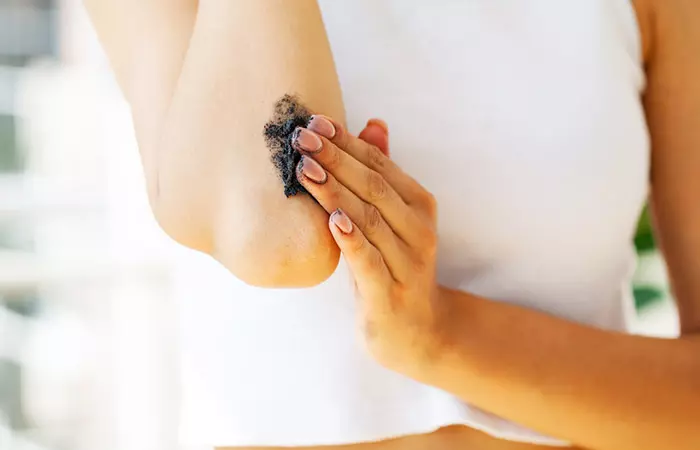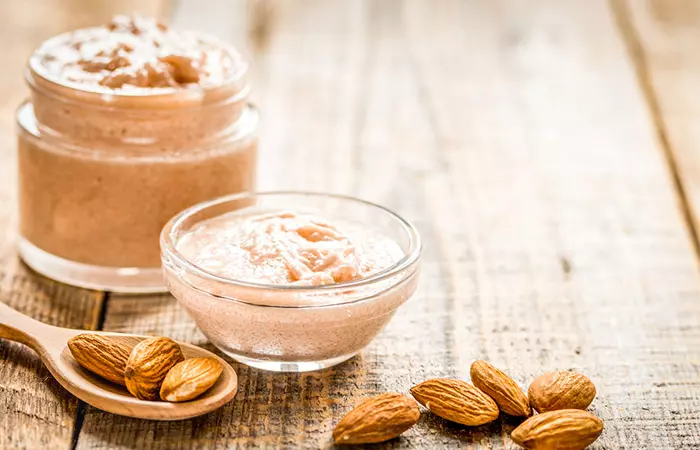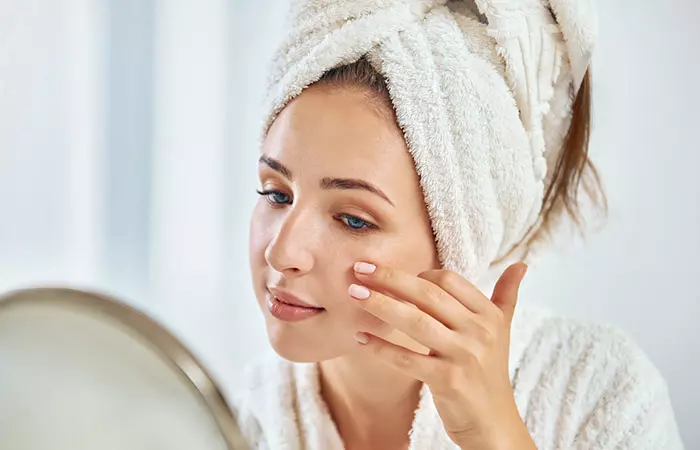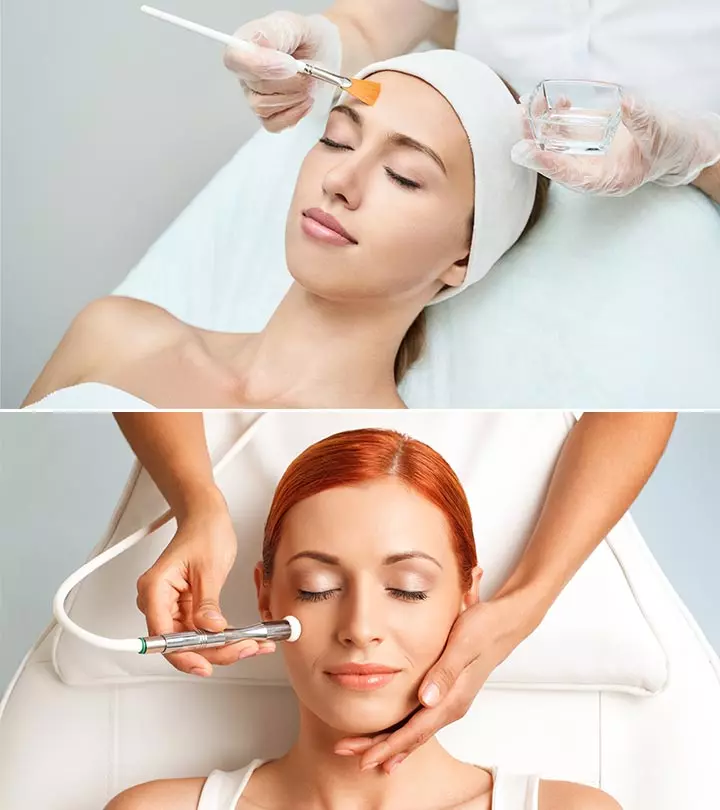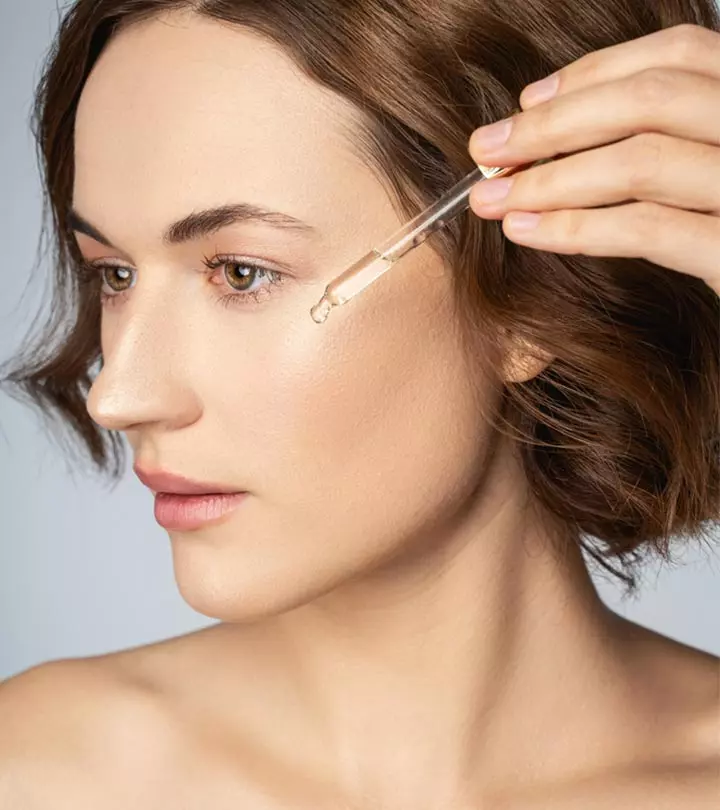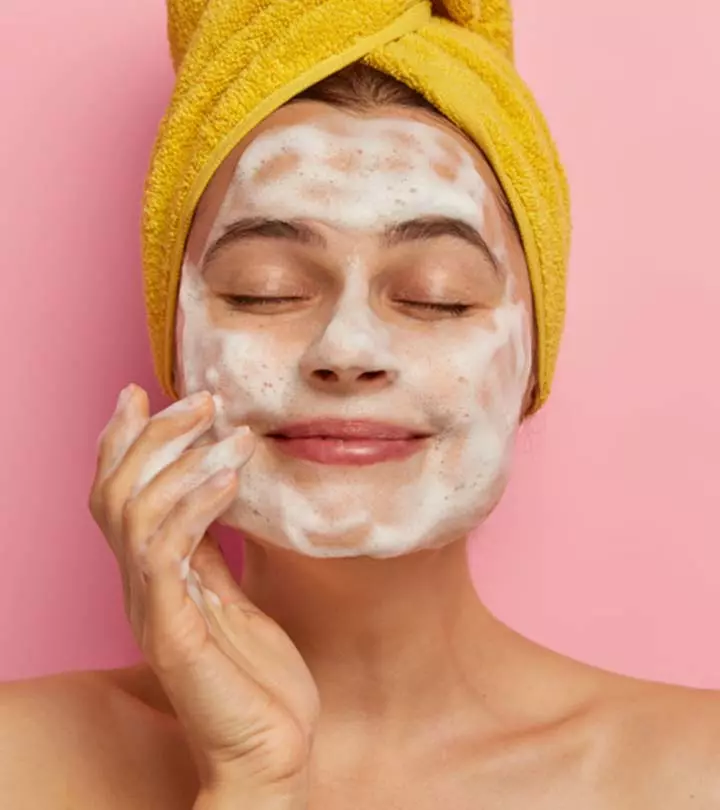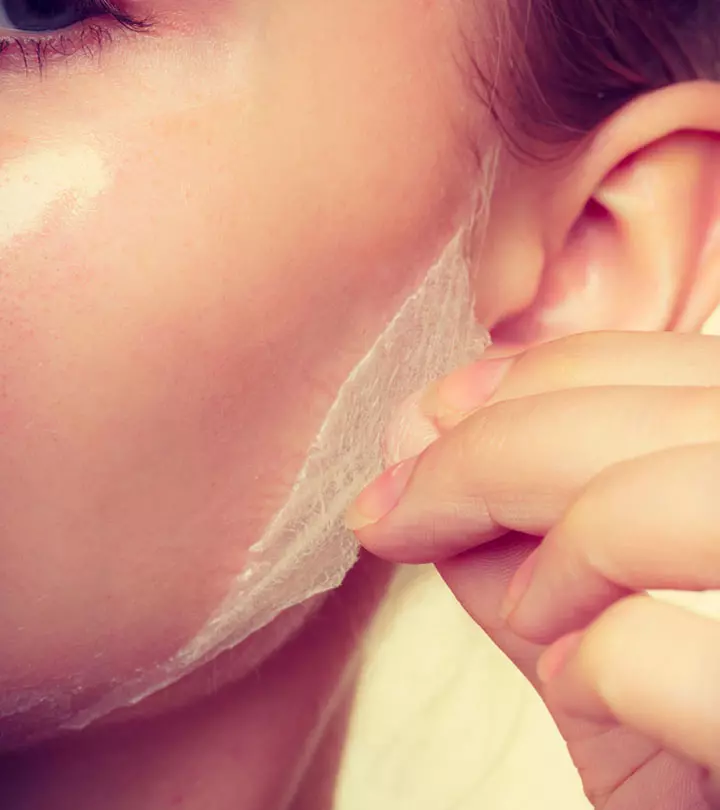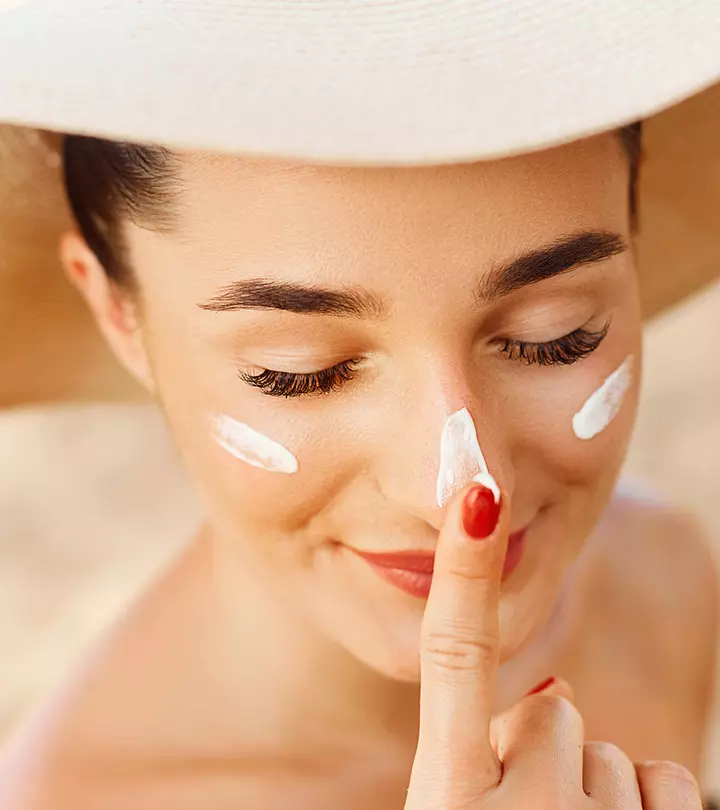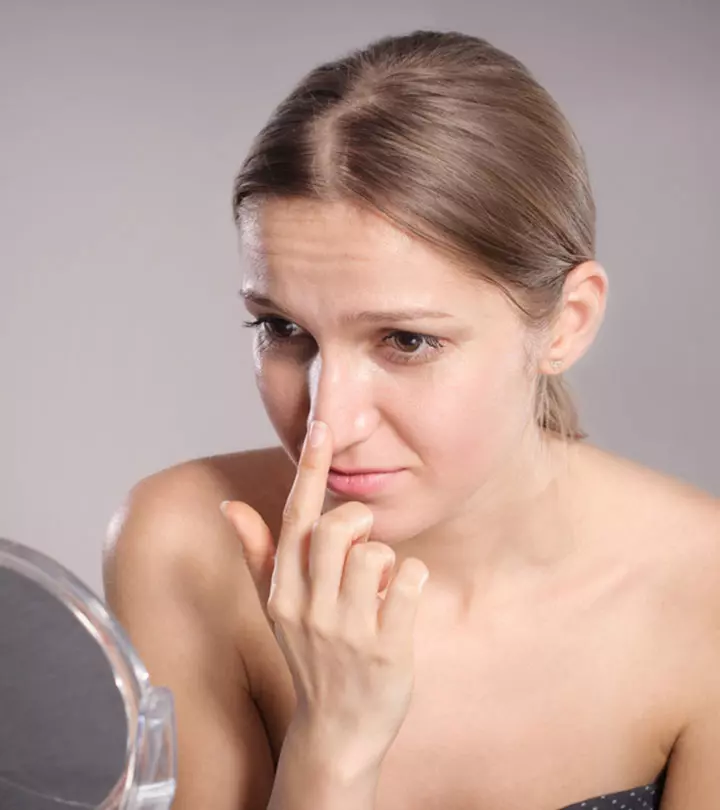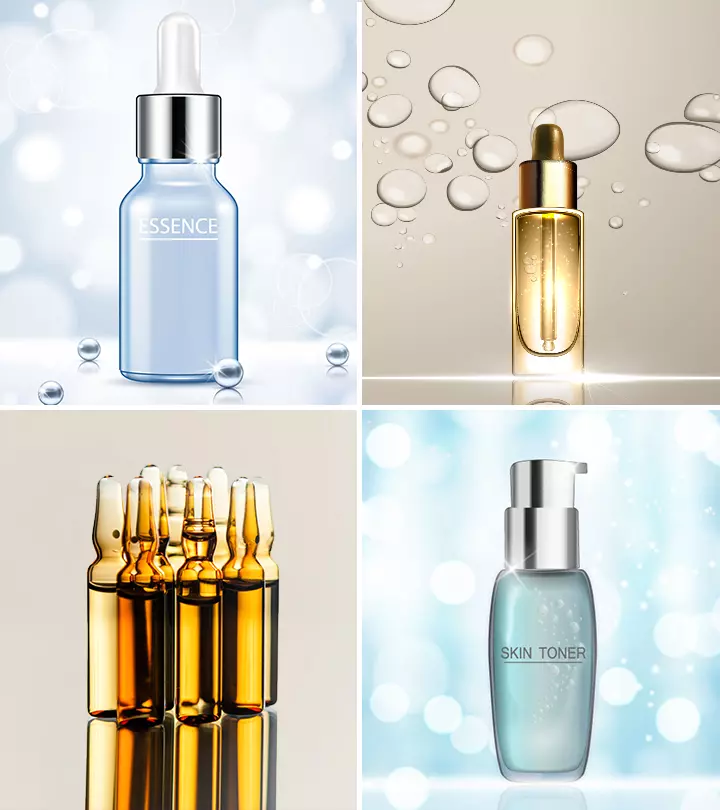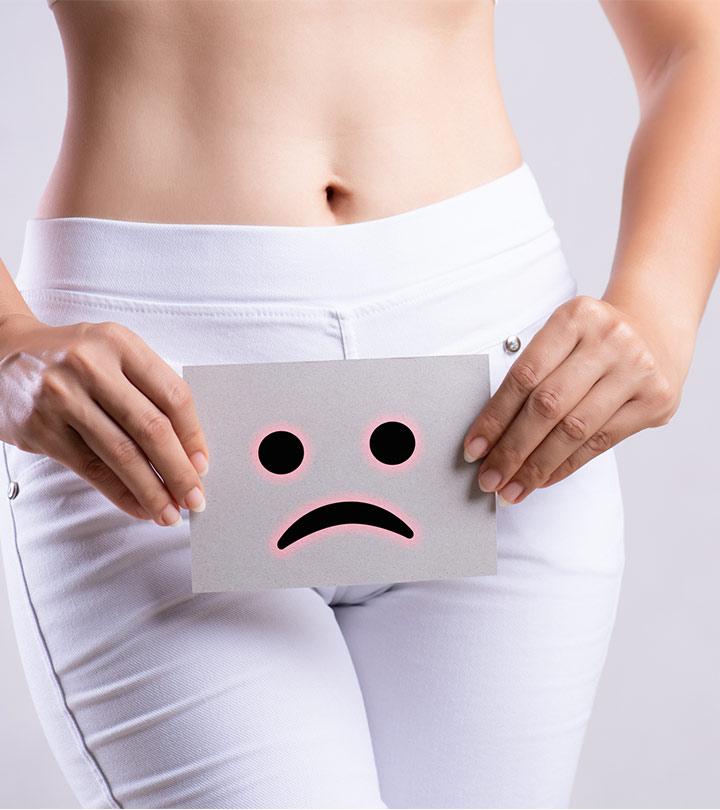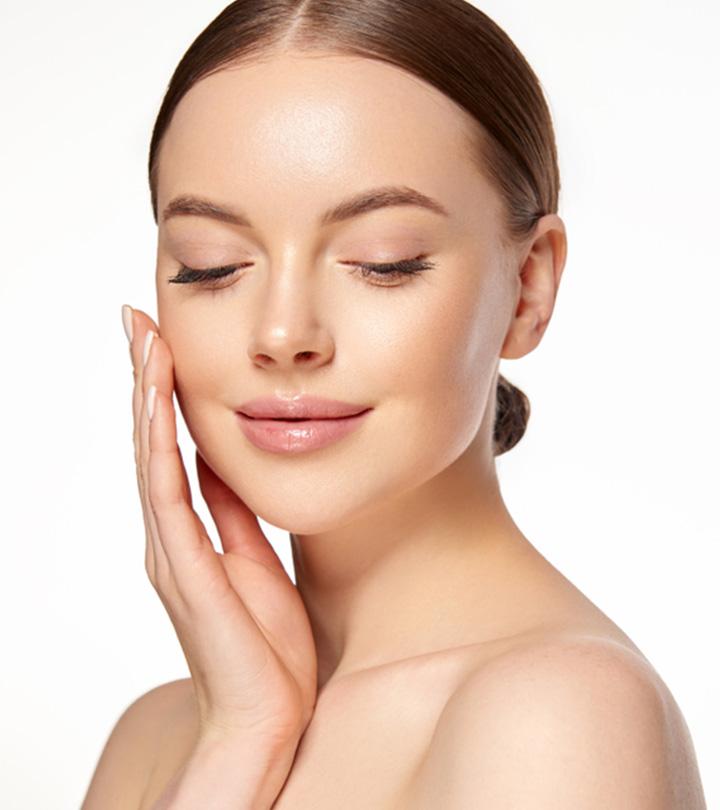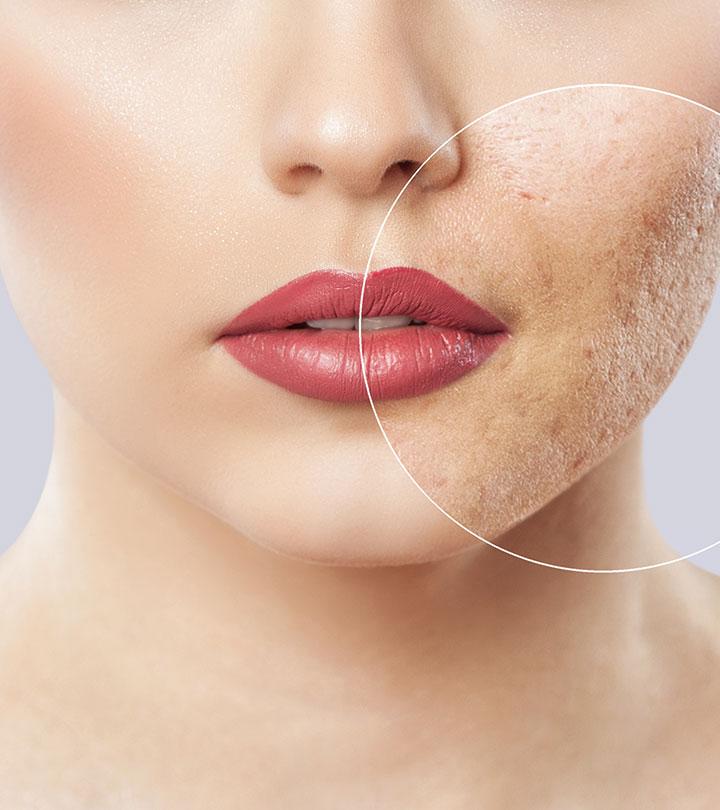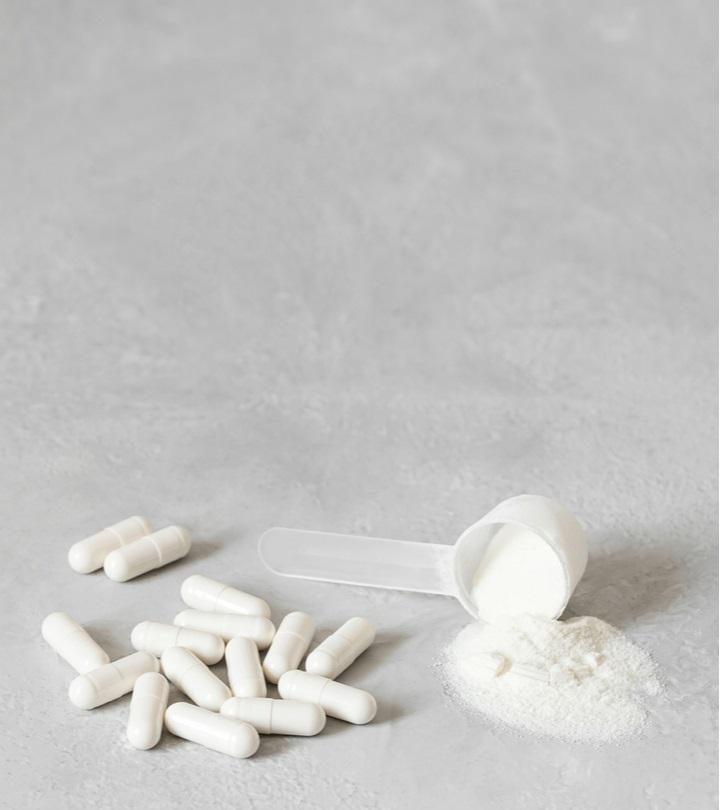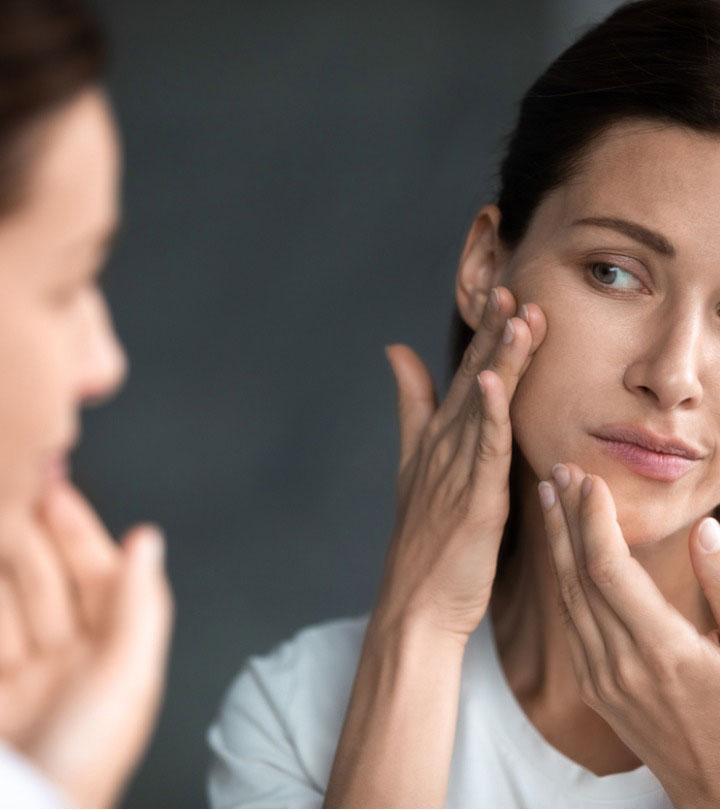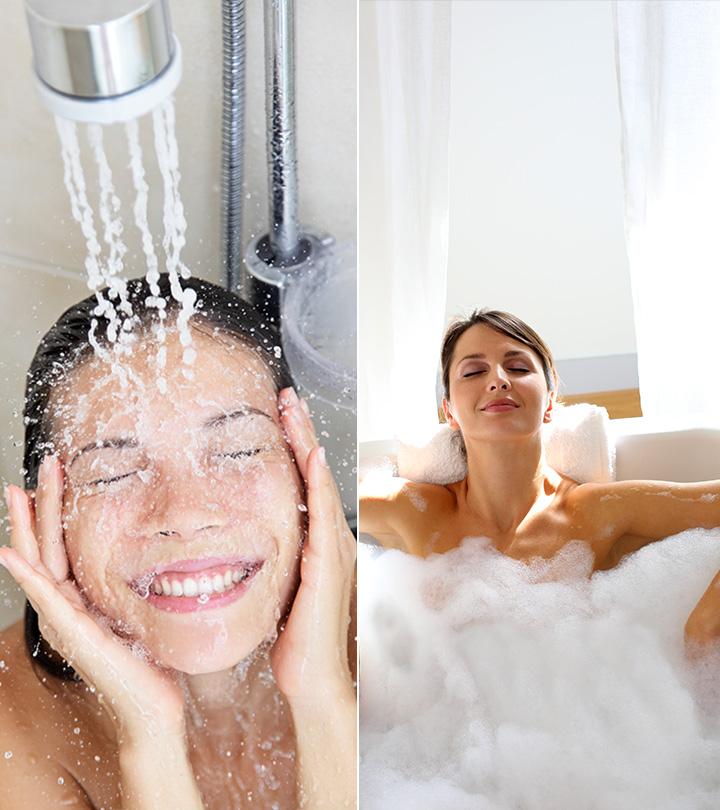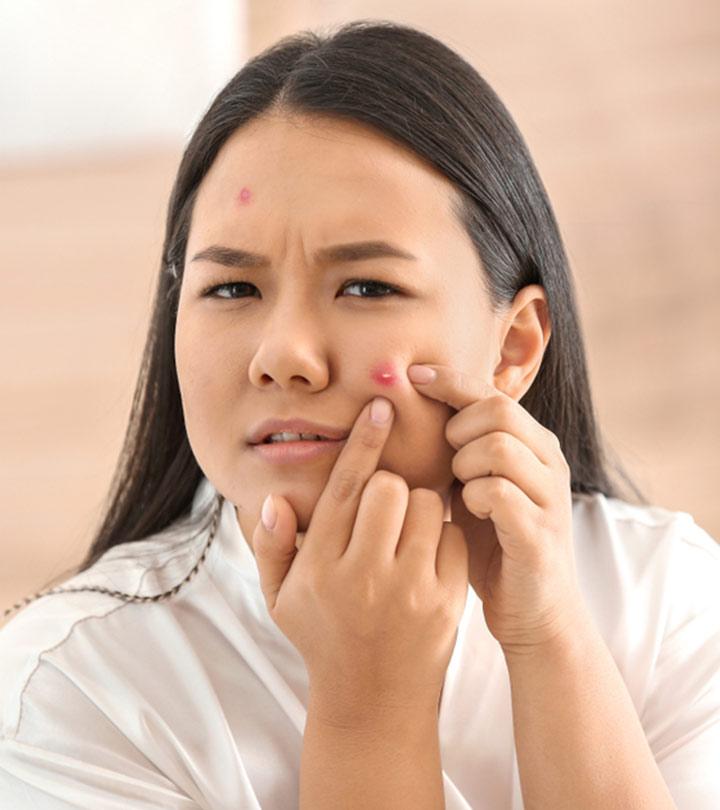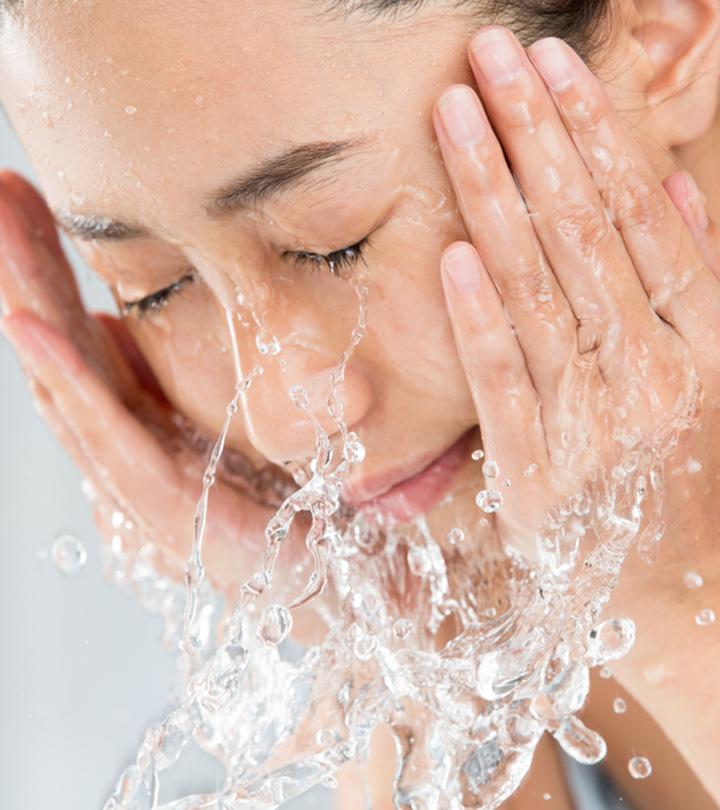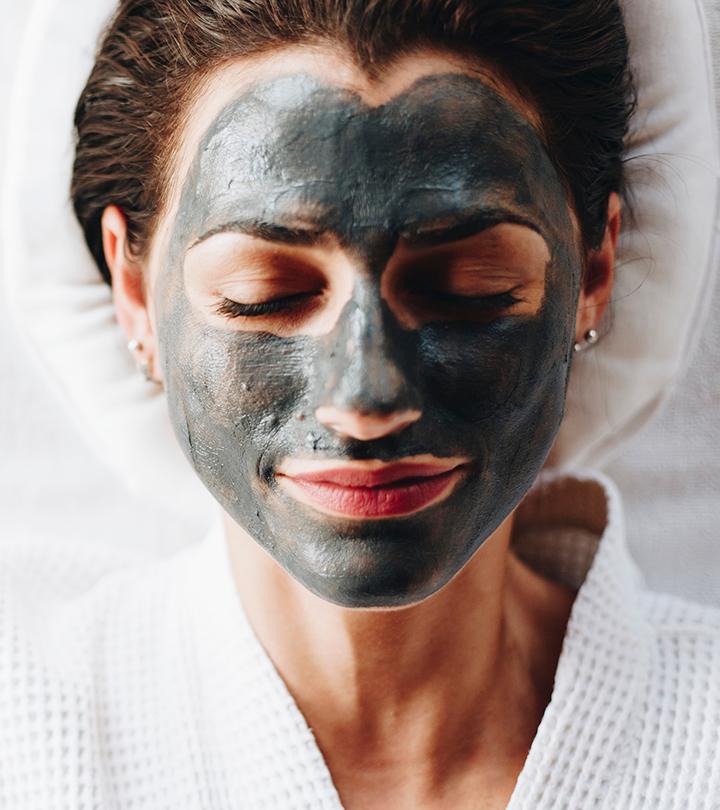Physical Vs. Chemical Exfoliation: Which Is Better?
Follow these simple steps to ensure you get the most out of your scrub time.
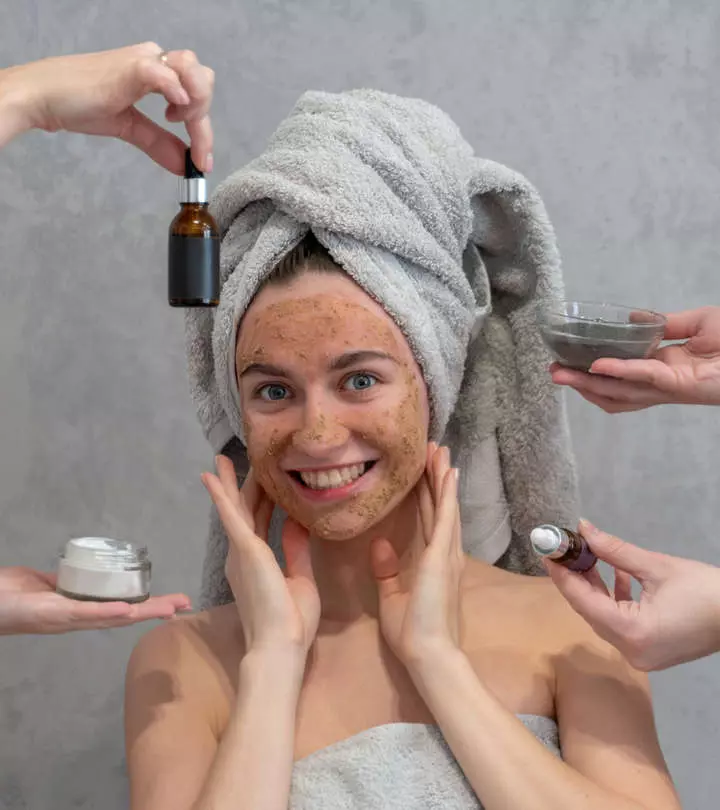
Image: Shutterstock
Caught up in the physical exfoliation vs. chemical exfoliation debate? Feeling confused about whether to scrub or chemically dissolve the dead skin cells? Don’t worry. We can help. While both effectively improve your skin texture and clear the pores, they may not suit all skin types. To reap the maximum benefits, you need to understand the difference between the two and pick one for your skin type. Keep reading to learn more.
In This Article
What Is Physical Exfoliation?
Physical exfoliation or manual exfoliation is when you have to buff away the dead skin cells manually. Physical exfoliators like scrubs contain grains and gritty materials (like grounded nuts) that gently scrape away the dead skin cells, dirt, and impurities from the skin. This smoothens the skin surface and improves radiance. when done with caution. If not done carefully, it can cause microabrasions..
Other than scrubs, physical exfoliators are available in many different forms like tools (at-home dermaplaning tools) and products like facial sponges.
 Trivia
TriviaIt is important to note that physical exfoliators are not suitable for all skin types. If you have acne-prone skin, avoid them completely. Let’s understand in detail.
What Type Of Skin Is Best Suited For Physical Exfoliation?
Physical exfoliation is best suited for body skin, especially the feet, knees, elbows, and fingers. The skin on the body is more resilient than the skin on your decolletage and face.
However, if you prefer scrubs for your face, you may use gentle ones. Avoid physical scrubs if you have acne-prone skin and active lesions, as scrubbing them can aggravate the inflammation. If you are buying commercial scrubs, here are a few ingredients to avoid.
Ingredients To Avoid In Physical Exfoliators
Avoid products that:
- Use large fruit pips and nuts as their large, rough, sharp edges can be harsh on the skin and cause irritation and micro-tears.
- Contain microbeads as they are non-biodegradable and may harm the environment.
- Contain chemicals like phthalatesi Chemical substances that are generally added to plastics but also serve as a binder or solvent in many skincare and cosmetic products. , parabensi A group of preservatives frequently found in pharmaceutical and cosmetic products that can disrupt fertility and increase the risk of cancer. , SLSi A common surfactant (used in lowering the surface tension between compounds) found in soaps and commercial cleansers. , synthetic colors and fragrances, and mineral oil.
Also, consider your skin type when buying physical exfoliators. If you have sensitive skin, use gentle exfoliators.
Chemical exfoliants do not contain abrasive ingredients like physical exfoliants. Let’s understand what they are.
What Is Chemical Exfoliation?
Chemical exfoliation dissolves the bonds between the dead skin cells with the help of chemicals like alpha and beta-hydroxy acids and fruit enzymes.
Chemical exfoliation can help brighten the skin, improve skin texture, and address pigmentation and fine lines. The most common chemical exfoliating agents are:
- Alpha-Hydroxy Acids: AHAs like glycolic acid, mandelic acid, and lactic acid can reduce the signs of photodamagei The effect of prolonged exposure to harmful UV rays of the sun on the skin, causing freckles, coarseness, and discoloration. , acne scars, hyperpigmentation, and melasmai A common skin disorder that causes discolored spots and patches on the skin, usually on areas exposed to sunlight. (1), (2). AHAs can also improve the water holding capacity of the skin (3).
- Beta-Hydroxy Acids: Salicylic acid is the most commonly used BHA that can penetrate the skin to break down the dirt and sebum buildup, promote exfoliation, reduce inflammation, and prevent acne breakouts (4).
- Plant Enzymes: These are best suited for sensitive skin and use plant-derived enzymes (like papain derived from papaya and bromelain from pineapple) to dissolve the top layer of the skin (1).
Doctors often use or prescribe retinoids and retinol-based products to improve skin texture.
 Did You Know?
Did You Know?Chemical exfoliants are available in different concentrations. Usually, the OTC exfoliants are milder than the professional medical-grade peels used by doctors. Let’s find out who can use them.
What Type Of Skin Is Best Suited For Chemical Exfoliation?
Chemical exfoliants suit all skin types, especially oily and acne-prone skin. You can use different types of facial acids for addressing different skin issues and types.
For instance, AHAs are especially beneficial for those who have acne, scarring, and pigmentation. BHA exfoliants are beneficial for acne-prone and oily skin. Enzyme exfoliation is much milder than AHA and BHA exfoliants and is suitable for sensitive skin.
These acids are added to different skin care products like face washes, body cleansers, creams, lotions, and serums. They are available in different concentrations. If you are new to chemical exfoliants or have sensitive skin, start with the lowest concentration and gradually increase the strength. You should use chemical exfoliants with caution.
Ingredients To Avoid In Chemical Exfoliators
Avoid the following things when using chemical exfoliators:
- Mixing different chemical exfoliators
- Using different types of exfoliators simultaneously
- Layering exfoliating products (like using a BHA serum after using a BHA or AHA cleanser)
- Using retinol with AHAs, BHAs, and plant enzymes
Whether using physical or chemical exfoliators, you have to be careful about the frequency to avoid irritating your skin.
How Often To Exfoliate
Exfoliate your skin once or twice a week. This is especially when you are using a separate physical scrub or an at-home chemical peel.
Nowadays, almost every other product – right from the cleanser and toner to the serum and moisturizer – contains some chemical exfoliator. Using them all at once can over-exfoliate your skin.
Check the ingredient list before using any product, and avoid using multiple exfoliating products at once.
When used in moderation, physical and chemical exfoliation can benefit your skin in multiple ways.
Benefits Of Exfoliation
Both physical and chemical exfoliation can:
- Unclog the skin pores, clear dirt and debris from the skin surface, and prevent breakouts.
- Improve the skin texture and make it smooth and soft.
- Help the skin absorb the skin care products better.
- Even out the skin tone by minimizing hyperpigmentation and dark patches and improving the texture.
- Improve skin radiance by boosting cell turnover rate.
On the flip side, there are several risk factors associated with physical and chemical exfoliators.
Physical Exfoliation Vs. Chemical Exfoliation: Side Effects
Physical Exfoliators
Excessive use of physical exfoliators and scrubbing harshly on sensitive and acne-prone skin may cause:
- Micro-tears
- Redness
- Inflammation
- Dry and flaky skin
The gritty particles in physical scrubs may also damage the acne lesions and increase pain and discomfort.
Chemical Exfoliators
Over-exfoliating and using high concentrations of at-home chemical peels without following the precautions may cause:
- Redness
- Dryness
- Stinging and burning sensations
- Hyperpigmentation
- Flaky skin
If you experience any symptoms, understand that either you are over-exfoliating or the exfoliant is too harsh for your skin. Stop using the products immediately, consult a dermatologist, and limit the frequency of exfoliation.
How To Exfoliate The Skin
If you are using a physical exfoliator or scrub:
- Wash your face or body with water.
- Massage the skin with the scrub gently in circular motions.
- Massage for a minute for the face and at least two minutes if exfoliating the body parts.
- Wash off with lukewarm water.
- Pat your skin dry and moisturize.
If you are using a chemical exfoliator:
- Cleanse your face and pat it dry.
- Apply the at-home chemical peel.
- Leave it on for not more than 10 minutes and wash off with regular water.
- Pat your skin dry and continue with the next skin care steps.
If you are using cleansers, toners, creams, and lotions that contain any of the AHAs, BHAs, and fruit enzymes, follow the instructions on the package.
Infographic: Comparison Between Physical And Chemical Exfoliation
Regular exfoliation is important to keep your skin clear, healthy, and glowing. You can exfoliate your skin physically or chemically, and either approach has its own pros and cons. Not all exfoliators suit all skin types. Hence, it is important to know what will work for you. In the infographic below, we have compared the functions and limitations of physical and chemical exfoliation. Take a look.
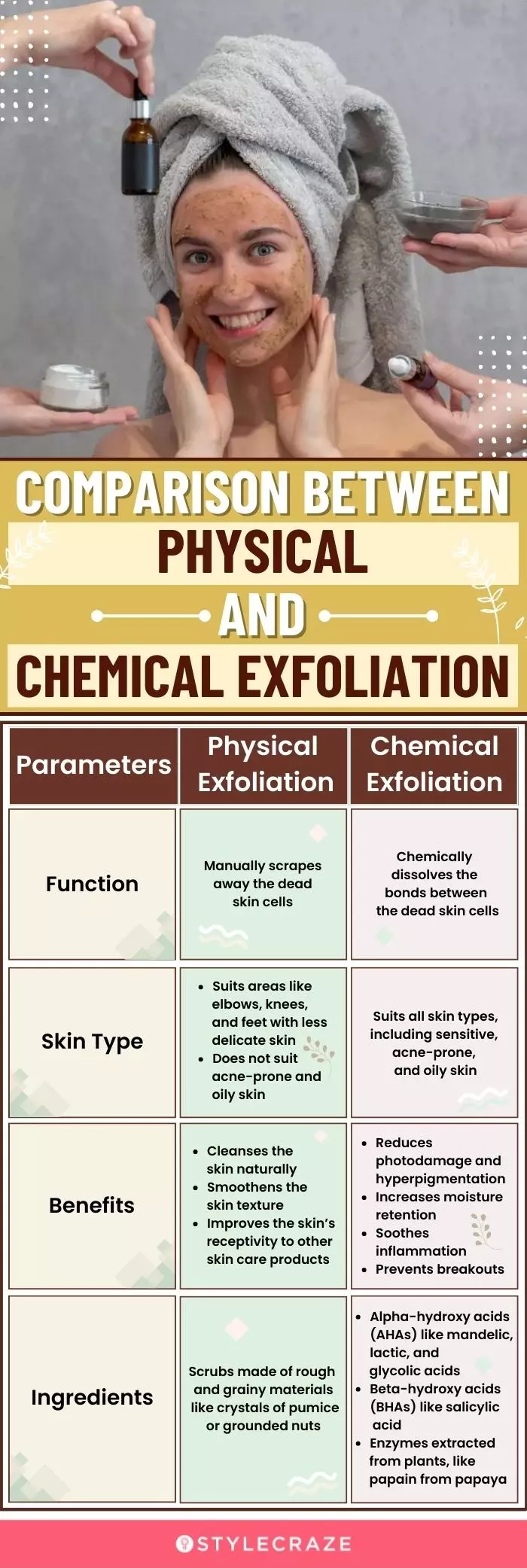
Illustration: StyleCraze Design Team
Exfoliation is an essential step in a skincare routine that helps get rid of dead skin cells and improve skin texture. We hope this article has given you clarity on the physical exfoliation vs. chemical exfoliation debate. Both are good for the skin, but you have to be careful about their usage. You may use physical exfoliants on your body as the body skin is more resilient than facial skin, and you may use chemical exfoliants on your face and décolleté. However, ensure that you are not over-exfoliating the skin. Exfoliate your skin only once or twice a week. As long as you are not over-exfoliating and your skin feels healthy, you may use whichever type of exfoliant you are comfortable with.
Frequently Asked Questions
Is salicylic acid a chemical exfoliant?
Yes. Salicylic acid is a beta-hydroxy acid that acts as a chemical exfoliant by peeling away the top layers of the skin.
Is chemical exfoliation necessary?
No. Chemical exfoliation isn’t necessary, but you can definitely benefit from it.
Should I exfoliate in the morning or at night?
You can reap maximum benefits by exfoliating in the morning as you will be able to remove all impurities, dead skin, and excess oil produced during the night.
How do you know if you are over-exfoliating?
Redness, itchiness, excessive dryness, and acne are some signs that you are over-exfoliating.
Is microdermabrasion a type of physical or chemical exfoliation?
Microdermabrasion is a type of physical exfoliation that uses tiny crystals to remove dead skin cells. It is a more intense form of exfoliation and should only be done by a professional. It can be an effective treatment for acne scars, fine lines, and uneven skin tone.
Key Takeaways
- Exfoliation helps slough off the layer of dirt and dead skin cell deposits, revealing your smooth, soft skin.
- While physical exfoliation involves scrubbing, chemical exfoliation involves dissolving the bonds between dead skin cells in the outermost layer of deposits.
- Sensitive, oily, or acne-prone skin types need to be careful about choosing which method suits their skin type better.
- While it is important to exfoliate your skin regularly, you should not overdo it that may otherwise cause more harm than good.
Want to learn the difference between physical and chemical exfoliation? If yes, take a look at this video to find your answers and know what you need to do to get the best results for your skin!
References
Articles on StyleCraze are backed by verified information from peer-reviewed and academic research papers, reputed organizations, research institutions, and medical associations to ensure accuracy and relevance. Read our editorial policy to learn more.
- Skin Care with Herbal Exfoliants
https://www.researchgate.net/publication/224892687_Skin_Care_with_Herbal_Exfoliants - Glycolic acid peel therapy – a current review
https://www.ncbi.nlm.nih.gov/pmc/articles/PMC3875240/ - Cosmetic and dermatologic use of alpha hydroxy acids
https://onlinelibrary.wiley.com/doi/pdf/10.1111/j.1610-0387.2012.07939.x - Hydroxy Acids the Most Widely Used Anti-aging Agents
https://www.ncbi.nlm.nih.gov/pmc/articles/PMC3941867/
Read full bio of Dr. Sravya Tipirneni
Read full bio of Anjali Sayee
Read full bio of Shiboli Chakraborti





